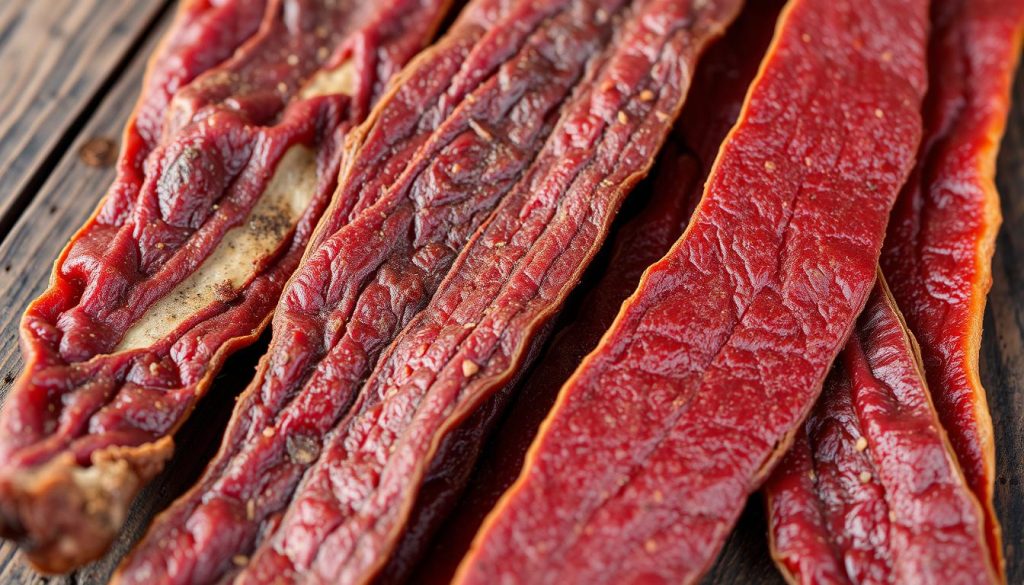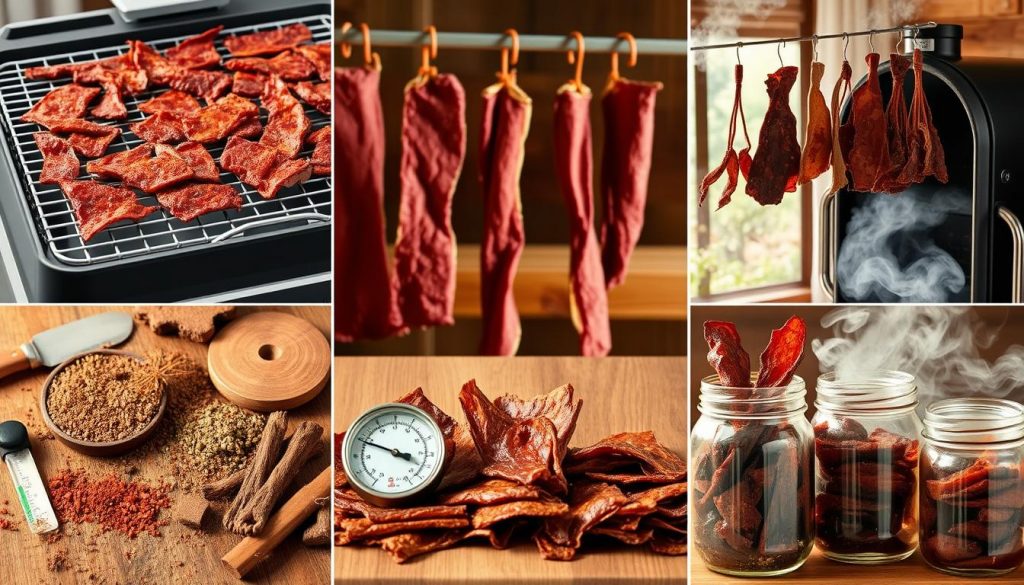Storing homemade jerky right is key to enjoying it. The shelf life of homemade beef jerky depends on how it’s made, the meat quality, and storage conditions. Generally, it can last from a week to several months in the fridge.
The curing agent is a big help in keeping jerky fresh. Sodium nitrite or celery juice powder fight off bacteria and add flavor. Using lean meat, like top round, also helps extend its shelf life.
Beef jerky can sit on a shelf for a while because it’s dry. But, the fridge is best for keeping it fresh longer. So, your homemade snack will stay tasty for more than a quick snack.
Key Takeaways
- Homemade beef jerky shelf life varies, lasting from one week to several months with refrigeration.
- Selecting lean meats and utilizing proper curing agents are key to extend shelf life.
- Storing homemade jerky in the fridge keeps it fresh longer than room temperature storage.
- Vacuum-sealed storage options can further enhance refrigerated beef jerky longevity, keeping the goodness locked in for weeks to months.
- While not obligatory for preservation, refrigeration is strongly recommended for those who prefer their jerky at peak flavor and texture.
The Shelf Life of Homemade Beef Jerky
When making homemade jerky preservation, several things affect how long it lasts. The meat type, drying method, and where you store it are key. Homemade beef jerky can last weeks to years if stored right. We’ll look at jerky storage tips and how they affect the beef jerky expiry date.
Choosing the right meat is the first step to long-lasting jerky. Lean meats like top round spoil less than fatty ones. Also, drying the jerky well is vital. Well-dried jerky can last years but will lose flavor and texture over time.
- Ziplock Bags: Handy for short storage, but not the best. They last about a week because they trap air and moisture, speeding up spoilage.
- Vacuum Sealing: This method greatly increases shelf life. Vacuum-sealed jerky can last at least a month. Vacuum storage containers can keep it fresh for up to five weeks.
- Freezing: Freezing in airtight conditions is best for long-term storage. Some have kept their jerky fresh for up to two years.
Other practices can also help keep jerky fresh longer. Make sure all moisture is gone before storing. Using oxygen absorber packets in the storage container can also help. Always let the jerky cool to room temperature before storing to let any extra moisture evaporate.
By following these homemade jerky preservation tips, your beef jerky will stay tasty and safe for a long time. This way, you can enjoy it for a longer period, keeping its flavor and texture.
Understanding Beef Jerky Preservation
Starting your homemade jerky journey means learning about beef jerky curing agents and the right meat. These are key for homemade jerky safety. We’ll explore why they’re important and how they affect your jerky’s quality and shelf life.
The Role of Curing Agents
Curing agents like sodium nitrite or celery juice powder are vital. They stop bacteria and mold from growing. This keeps your jerky safe and tasty.
Selecting the Right Meat
Choosing lean meat for jerky is best for its shelf life and quality. Lean cuts like top round have less fat, which means your jerky lasts longer. This choice also affects the drying process and taste.
| Jerky Aspect | With Lean Meat | With Fatty Meat |
|---|---|---|
| Shelf Life | Significantly Longer | Reduced Due to Fat Spoilage |
| Safety | Higher (reduced risk of spoilage) | Lower (increased risk of spoilage) |
| Flavor After Curing | Better Preserved | Declines as Fat Rancifies |
In conclusion, using beef jerky curing agents and choosing lean meat for jerky are essential. They ensure your homemade jerky is safe, tasty, and lasts a long time. These choices greatly improve homemade jerky safety and quality, giving you peace of mind and great results.
How to Detect Spoilage in Beef Jerky
Keeping your beef jerky safe and tasty means knowing how to spot spoilage signs in jerky. Whether you’re a pro or just starting out, it’s key to check for these signs. This way, you can avoid eating spoiled jerky.
Visual Inspection for Mold and Discoloration
Start by looking at the jerky. Check for mold, which looks like white or green fuzzy spots. Also, watch for color changes that aren’t normal. These signs can mean the jerky has gone bad and might be harmful to eat.
Smell Test for Rancidity
The smell of beef jerky is important too. Good jerky smells a bit smoky and meaty. But if it smells sour or rancid, it’s bad. This smell comes from spoilage and means the jerky is not safe to eat.

In short, always check for spoilage signs in jerky to make sure it’s safe and tasty. Remember, it’s safer to throw away any jerky that looks or smells off.
Short-Term vs. Long-Term Beef Jerky Storage Tactics
Understanding the difference between short-term and long-term storage for beef jerky is key. Each method has its own needs for preserving homemade jerky. They help keep the jerky fresh and flavorful for longer.
For short-term storage, 1 to 3 months, stand-up pouches or Mylar bags work well. They’re good for when you’ll eat the jerky soon. Keeping it in a dark, cool helps keep it fresh. For longer storage, vacuum-sealed bags with oxygen absorbers are best. They can keep jerky fresh for up to six months or more, depending on storage.
- Properly seal homemade jerky to prevent exposure to air and moisture.
- Store jerky in a cool, dark place to avoid degradation by light and heat.
- Consider using desiccants for moisture control to prevent mold growth.
These jerky shelf life optimization methods keep the food fresh and nutritious. Freezing in a vacuum-sealed bag is the best for long-term storage. It can keep your jerky fresh forever.
For effective jerky preservation, keep the moisture low. Aim for 90% to 95% moisture removal during drying. This prevents mold and ensures long-term preservation.
Whether you choose short-term or long-term storage, these beef jerky storage methods are essential. They help keep your homemade jerky tasty and safe. By following these tips, you’ll enjoy your jerky more and for longer.
How Long Does Homemade Beef Jerky Last in the Fridge
Knowing how long refrigerated jerky shelf life lasts is key for jerky lovers. Keeping jerky in the fridge helps it stay fresh longer than at room temperature. This is a common method for keeping jerky tasty.
For the best storing jerky in fridge tips, consider several important factors. Homemade beef jerky can last one to two weeks in the fridge. But, it needs to be stored correctly to last that long.
One top tip is to let the jerky cool down before putting it in the fridge. This stops moisture from building up in the packaging. Moisture can lead to bacterial growth and spoilage.
- Use airtight containers or sealable plastic bags to keep air and humidity out.
- Trim off any extra fat from the jerky before storing. Fat can spoil quickly.
- Adding a food-grade desiccant packet in the container can help absorb any leftover moisture.
If you want to keep your refrigerated jerky shelf life longer than two weeks, think about using a vacuum sealer. Vacuum-sealed jerky can last up to a year in the fridge if it’s not opened.
In summary, the right preparation and storage are essential for keeping homemade beef jerky fresh. By following these tips, your jerky will stay safe, tasty, and fresh for longer. Keeping your jerky fresh not only makes snacking better but also keeps it safe to eat.
The Importance of Proper Jerky Drying Method
Making delicious beef jerky at home requires mastering drying techniques. It’s important to use the right jerky dehydration techniques and get the jerky dryness level just right. This ensures your jerky stays flavorful and safe to eat.
Dehydrators vs. Ovens
There are two main ways to dry jerky: using a dehydrator or an oven drying jerky method. Dehydrators work well because they control temperature and air flow evenly. This makes them great for drying jerky without much effort.
Ovens are easier to find in homes but need more attention. They can dry jerky too much or unevenly if not watched closely.
Impact of Meat Thickness on Drying Time
The thickness of meat slices is key to drying time and success. Thinner slices dry faster and more evenly, which helps avoid spoilage. But, if they’re too thin, they can become too hard and lose their chewy texture.
Finding the right thickness is a balance. It affects both the jerky dryness level and taste.
For those looking to improve their jerky-making, here’s a table with important points:
| Method | Advantages | Disadvantages | Recommended Thickness |
|---|---|---|---|
| Dehydrator | Consistent temperature, even drying | Requires equipment purchase | 1/4 inch |
| Oven | Readily available, can be quicker | Requires careful monitoring, possible uneven drying | 1/4 to 3/8 inch |
Choosing the right jerky dehydration techniques and keeping an eye on the jerky dryness level is critical. It ensures your homemade jerky is safe, tasty, and lasts long. Whether you use a dehydrator or an oven, knowing these tips will help you make better jerky every time.

Maximizing Beef Jerky Longevity
To keep your homemade beef jerky tasty and safe, using the right storage is key. Vacuum storage is a game-changer for extending jerky life. It cuts down on air exposure, which means less chance of spoilage.
Using Vacuum-Sealed Containers
Vacuum-sealed containers are great for keeping beef jerky fresh longer. Our tests show that homemade jerky can last 1-2 months in a cool, dry spot. But, it can stay good for 6 months in the pantry and up to a year in the fridge. This method keeps the jerky’s texture, taste, and nutrients intact.
Benefits of Oxygen Absorbers
Adding oxygen absorbers to your vacuum-sealed jerky can make it last even longer. These absorbers remove any leftover oxygen, stopping bacteria and spoilage. This is a big win for keeping jerky fresh and tasty for a long time.
Using vacuum storage and oxygen absorbers together means you can enjoy your jerky for months. It’s perfect for quick snacks or for when you need to be prepared. These methods offer a reliable way to keep your jerky in top condition.
Differences Between Commercial and Homemade Jerky Shelf Life
When looking at beef jerky shelf life, it’s important to know the difference between store-bought and homemade. Commercial jerky can last up to a year from its packaging date. This is thanks to advanced preservation methods not available at home.
Commercial jerky stays safe to eat even after its best-by date, if stored right. It needs to be kept away from moisture, heat, and oxygen.
Homemade jerky, on the other hand, lasts about one to two months if vacuum sealed. Without sealing, its shelf life drops a lot. The main reason for this difference is the drying and sealing process used by commercial makers.
Here’s a quick comparison:
| Storage Condition | Commercial Jerky Shelf Life | Homemade Jerky Shelf Life |
|---|---|---|
| Unopened at Room Temperature | 1 year | 1-2 months |
| Opened and Refrigerated | Up to 2 weeks | 1 week |
| Vacuum Sealed | 1 year | 1-2 months |
Homemade jerky in standard ziplock bags usually lasts only a week. Freezing, which removes air and moisture, can make homemade jerky last almost forever.
Vacuum sealing and proper storage are key for extending the freshness of homemade jerky, bringing it closer to the longevity seen with commercial products.
Whether you buy commercial or make your own, knowing these differences helps. Storing it right ensures your jerky stays fresh and tasty longer.
Freezing Beef Jerky for Extended Preservation
We love keeping homemade beef jerky fresh for a long time. Freezing it is a great way to keep its taste and texture. Sealed packaging is key to keeping it fresh in the freezer. This way, your jerky can last over two years.
Step-by-Step Guide to Freezing Jerky
Use vacuum-sealed bags to keep the jerky fresh. These bags are perfect for freezing. They can make your jerky last up to 24 months in the freezer.
Freezing adds 6-12 months to your jerky’s life. It’s a smart move for flavor and convenience.
Thawing and Consuming Previously Frozen Jerky
Thawing frozen jerky is just as important as freezing it. Put it in the fridge to thaw slowly. This keeps it chewy and tasty.
Whether it’s been in the fridge or freezer, thawing right makes it just as good. Check out how long does beef jerky last for more tips. Keeping it away from heat and sunlight helps it last longer.




